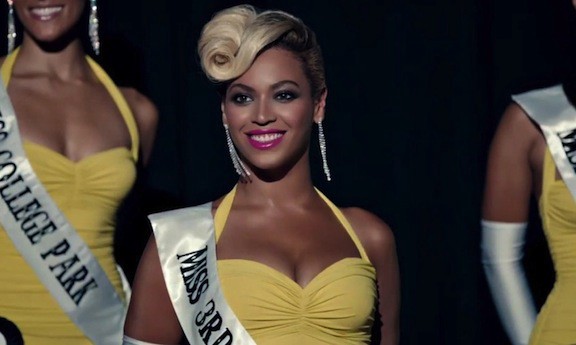It’s been a great year for female empowerment in pop. Madonna and Lady Gaga became music’s top earners, Top 40 hosted ballads and art-dance songs about female strength, former riot grrrl Kathleen Hanna returned with a new album, and the worst excesses of the industry’s sexism were satirized and criticized by a younger generation of singers.
At the end of all that awesomeness came Beyonce, the album whose nonhype created more hype than any record company could ever afford to buy. Last week, Beyonce released her fifth album for sale on iTunes, and the only announcement for it was the word “Surprise!” on her Instagram account. It was a watershed moment for the music industry. As the New York Times notes, “The stealth rollout of the album, Beyonce, upended the music industry’s conventional wisdom, and was a smashing success. … In bypassing the industry’s traditional promotional machinery, she demonstrated social media’s power to amplify news and to forge a direct connection to her audience.”
But Beyonce isn’t just a stroke of marketing genius. Its nontraditional break from the vaults feels like a metaphor for the contents of the album, which serves as a coming-out party for Beyonce the Feminist. Two songs in particular, “Pretty Hurts” and “Flawless,” have gotten a great deal of attention from femmepowerment-watchers for their deconstructions of beauty, in particular the sacrifice and effort that go into creating an instance of feminine perfection.
https://www.youtube.com/watch?v=3Spe7yQ6EFw
In the preview video for “Pretty Hurts,” a pageant worker measures Beyonce’s waist and slaps her thighs and stomach, while she sings, “Mama said, ‘You’re a pretty girl. What’s in your head, it doesn’t matter/Brush your hair, fix your teeth/What you wear is all that matters.’” Later, when she sings, “Blonder hair, flat chest/TV says, ‘Bigger is better.’/South Beach, sugar free/Vogue says, ‘Thinner is better.’”
The song isn’t just a critique of the punishing regimen beauty exacts, but also the way white notions of beauty get universalized as the physical ideal all girls and women should aspire to reach. As Slate notes, the beauty-pageant setting detracts from the power of Beyonce’s message, as most of us tend to think of those swimsuit contests as a rather extreme example of body policing.
More accessible is the message she conveys in “***Flawless,” a song that’s attracting a lot of notice for its sampling of a TED talk by Nigerian feminist Chimamanda Ngozi Adichie. The excerpt:
We teach girls to shrink themselves, to make themselves smaller
We say to girls: “You can have ambition, but not too much
You should aim to be successful, but not too successful
Otherwise, you will threaten the man”
Because I am female, I am expected to aspire to marriage
I am expected to make my life choices always keeping in mind that marriage is most important
Now, marriage can be a source of joy and love and mutual support
But why do we teach girls to aspire to marriage and we don’t teach boys the same?
We raise girls to see each other as competitors
Not for jobs or for accomplishments, which I think can be a good thing
But for the attention of men
We teach girls that they cannot be sexual beings in the way that boys are
Feminist: a person who believes in the social
Political, and economic equality of the sexes
Beyonce still fights back against media airbrushing in this song, sarcastically growling “I woke up like this” in the chorus. But the song has also has a larger point about the way we channel female ambition into the rabbit-hole-like quest for beauty to the extent that we’re teaching girls to strive for success in a field very few will ultimately ever win, and the success of which won’t last anyway.
Does it matter that Beyonce is one of those who have won the beauty game, that she’s essentially critiquing a culture of which she’s an obvious beneficiary? After all, despite the criticisms Beyonce lodges against the undue, even harmful, prioritization of female beauty and the deception that is physical perfection, she still appears flawless in these two videos and in public. And earlier this year, Beyonce made headlines when she tried to rid the Internet of unflattering photos taken of her during her Superbowl half-time show.
There might be a smidge of hypocrisy in Beyonce’s overall media campaign, but to me, it doesn’t really matter. Along with her sisters in pop, Beyonce’s helping her industry grow up by making a space for serious ideas. And there’s no doubt Beyonce has diversified America’s notions — and by extension, the world’s — of what beauty looks like, an achievement for which she’s not celebrated enough. With the pioneering launch of her latest album and her declaration in “***Flawless” that she’s not “just [Jay-Z’s] little wife,” Beyonce reminds us that she’s been boasting that she’s an “independent woman” all along.
Since Beyonce’s new singles aren’t yet available on YouTube, here’s a Monday pick-me up:






